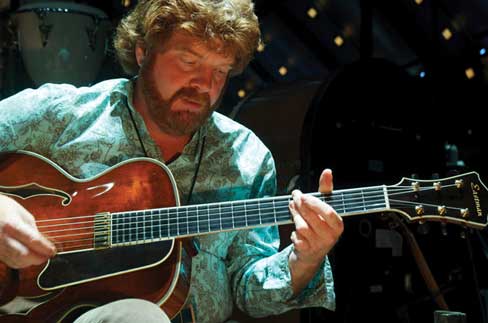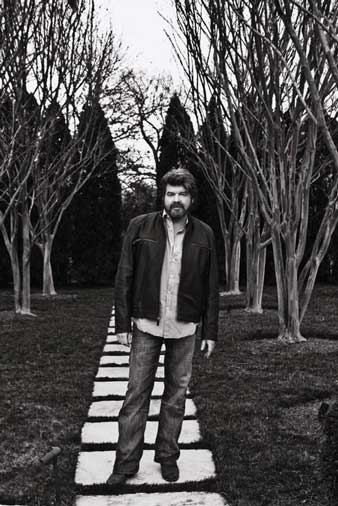Mac McAnally: Exploring the highways and byways of accentuating the positive, but not without doubt
Hallelujah, Brother
By David McGee
DOWN BY THE RIVER
Mac McAnally
Show Dog NashvilleNattering nabobs of negativism best be moving on instead of dipping into Mac McAnnallly's superb, deeply personal Down By the River.
No, wait. Let's rethink this.
Nattering nabobs of negativism are hereby advised to shelve the pessimism and listen to what Mac McAnnally has to say on his superb, deeply personal Down By the River. A superior songwriter whose writing voice of late has been heard (in other artists' numerous covers of his songs) more than has his own singing voice, Alabama-born McAnnally, perhaps better known as a member of his benefactor Jimmy Buffett's Coral Reefer Band, is making the most of this, his tenth solo album, but first such long player since 2004's Semi-True Stories. "I have an optimistic nature/But I also love the blues," he sings in the album's closing song, "Until Then," which goes on to advise taking life as it comes while also finding "your passion." Over the course of 11 songs, the husky-voiced singer-songwriter explores the highways and byways of accentuating the positive, suggests an embrace of faith might be what the doctor ordered to keep things in perspective, and broadly advances a school of thought on the value of not so much living in the moment—although he most certainly embraces the idea of savoring the here and now—as finding a balance suitable for long-term happiness and productivity.
Now lest anyone think Mac's gone all preachy and New Age on us, he dismisses such concerns right out of the box, with the greasy, slippery Dixieland romp of "Blame It On New Orleans," a good humored missive accusing the Crescent City of imbuing him with an appreciation of the finer things in life—"I like hot sauce/I love that Southern style/I try to find a way/Every day to smile/Quite honestly/I blame it on New Orleans," he sings at the outset, before going on to tip his hat approvingly to "the people, who make the most of life," "I like the ladies, hey what's not to like," "I like the music, blues and Dixieland," and culinary hot spots such as "Nola, Café Dumonde and Mother's/K-Paul and all the others." He then promptly atones for his worldly pursuits in a deliciously funky slice of gospel-fueled testifying in "Down By the River," a cautionary treatise reminding one and all to bear in mind, during all those hedonistic pursuits, how one day the old account must be settled, not an easy message to digest when the rhythm is so infectiously driving, the acoustic guitar so buoyantly energetic, the organ and fiddle so delightfully celebratory and Mac himself having such a good time imparting his wisdom.
'If you can have a good time when times are tough/Then maybe, just maybe/You get around to figuring out/What you can do and do without/And you'll recognize the real stuff.'
This is but prelude to one of the best country songs you'll hear in this or any other year, a mixture of twang, stomp and common sense titled "If You Hang Around Long Enough," which posits the very act of continuing to show up as the road to a true appreciation of life's deepest and lasting pleasures, to wit, "If you can have a good time when times are tough/Then maybe, just maybe/You get around to figuring out/What you can do and do without/And you'll recognize the real stuff." And if you've come this far and don't understand what he means by "the real stuff," then you've got more work to do than mere music can compensate for. Mac's Buffett roots show up in the reggae-tinged "(Nothing Like A) Sunny Day," a bit of philosophy Lite in its theorizing about how a sunny day—clearly evidence of a benevolent God's existence—can make a troubled soul, indeed a troubled society, feel better about itself, assuming we're open to the message implicit in Old Sol's beaming visage.
What really puts the meat on the bone here, though, is McAnally's internal conflict with his own message. This turmoil plays out twice, in songs tellingly titled "Unresolved" and "Big Disappointment." Interestingly, both involve Christmas, a day that looms large in the artist's theological orientation. In a roiling, guitar heavy power ballad-aspiring arrangement, "Unresolved" chronicles a life unmoored in childhood when a father ran off, never to return to his family. The boy he left behind, now singing this song, counts his many blessings of adulthood, but admits to a lingering emptiness at his core. Over a chorus marked by churchy piano and booming percussion, McAnally, rage barely concealed, enumerates a litany of annual, empty rituals—"What I want for Christmas/What I wish upon a star/I blow out all the candles/In every birthday so far/And when I lay me down to sleep I pray"—concluding with all those New Year's resolutions left, yes, unresolved. In "Big Disappointment," over his insistently strummed acoustic guitar and folksy harmonica fills, McAnally, sounding more upbeat than he does on "Unresolved," nevertheless describes, verse by verse, one personal triumph after another culminating in soul numbing deflation, including winning the lottery, dating supermodels, finding a cure for cancer, winning the Super Bowl and the Nobel Prize, marriage itself ("all twenty-seven times"). In the closing verse, our unfulfilled searcher sends out a lament for "the working man/unschooled and unrefined/so unsophisticated/that he's happy all the time." This being the penultimate track, we've come too far with McAnally to take him literally, figuratively or any other way but ironically, him having preached long and persuasively on the pursuit of happiness via the love of simple, non-material virtues and small but fulfilling pleasures, the twin pillars of a successful life. If he's felt let down by God at certain junctures, then he can get in line with Jeremiah, Habakkuk, Job and that Al Capp character who always had a thundercloud hanging over his head, all afflicted with problems arising from life being unfair. Had Down by The River ended there, we could worry further over Mac's metaphysical and ontological concerns ultimately proving debilitative, but instead we are sent home with the aforementioned "Until Then," wherein he reprises the "wish upon a star" sentiment from "Unresolved" but now in a decidedly optimistic context: "Excuse me while I wish upon a star/See how much alike we really are," before concluding—resolving, you might say—with a soothing, affirmative benediction as the summation of this provocative journey: "Take your time, find your passion/Life goes on until it ends/Don't stop living until then..." Cue Mac's beatific smile. He had us at New Orleans.
THE BLUEGRASS SPECIAL
Founder/Publisher/Editor: David McGee
Contributing Editors: Billy Altman, Laura Fissinger, Christopher Hill, Derk Richardson
Logo Design: John Mendelsohn (www.johnmendelsohn.com)
Website Design: Kieran McGee (www.kieranmcgee.com)
Staff Photographers: Audrey Harrod (Louisville, KY; www.flickr.com/audreyharrod), Alicia Zappier (New York)
E-mail: thebluegrassspecial@gmail.com
Mailing Address: David McGee, 201 W. 85 St.—5B, New York, NY 10024
Founder/Publisher/Editor: David McGee
Contributing Editors: Billy Altman, Laura Fissinger, Christopher Hill, Derk Richardson
Logo Design: John Mendelsohn (www.johnmendelsohn.com)
Website Design: Kieran McGee (www.kieranmcgee.com)
Staff Photographers: Audrey Harrod (Louisville, KY; www.flickr.com/audreyharrod), Alicia Zappier (New York)
E-mail: thebluegrassspecial@gmail.com
Mailing Address: David McGee, 201 W. 85 St.—5B, New York, NY 10024



